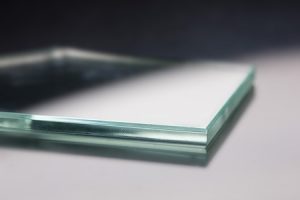 Here at ProCurve, we like to keep our customers educated on the many glass options available within the industry.
Here at ProCurve, we like to keep our customers educated on the many glass options available within the industry.
Two common glass types include heat-treated glass and chemically strengthened glass.
Let’s dive into each category.
Heat-Treated Glass
As far as heat-treated glass is concerned, the process provides the glass with a greater resistance to mechanical and thermal stresses as well as archiving break patterns in safety glazing applications.
The heat-treating effect is accomplished by cutting the glass to the desired size then putting it through a furnace and heating it to approximately 1150 degrees Fahrenheit. When it leaves the furnace, it is rapidly cooled with machines that blow air uniformly onto both surfaces simultaneously.
The dependability of heat-treated glass comes from the two compression layers with a tension zone centered in the middle of the glass. The compression zones make up 20% of the thickness of the glass.
It should be noted that heat-treating does not affect the chemical composition, light transmission or color of the glass. In addition, hardness, specific gravity, expansion coefficient, softening point, thermal conductivity, solar transmittance, and stiffness also remain unchanged.
In the end, the result is a product that is more durable than an annealed glass of the same size and thickness. Glass heat-treated to high compression levels is also four times stronger than annealed glass.
Chemically Strengthened Glass
Chemically strengthened glass uses the process of ion-exchange, which has it submersed in a molten salt bath at temperatures below the annealing range of the glass or sitting in a salt bath of potassium nitrate.
Depending on several variables including the glass composition, strengthening process, level of abrasion, and the application environment, it is commonly understood that this type of glass is stronger than annealed glass.
Chemically strengthened glass has a break pattern similar to annealed glass, it can experience a loss of strength due to post-fabrication cutting and scratching, and it has an increased amount of flexure due to increased levels of surface compression.
At ProCurve, we are the experts when it comes to high-performance custom bent and curved glass. Contact us today to learn more about our processes and our unique carved glass designs.
